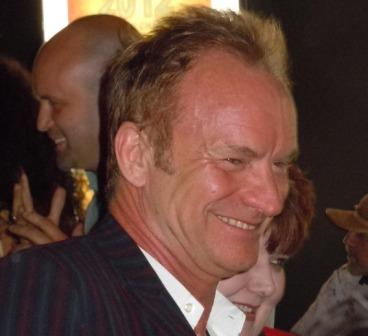Sting was standing close to me (but not too close!) in the lobby of the Chelsea movie theater -- where Daniel Pinchbeck's new film 2012: Time for Change had just premiered --- affably speaking with a couple of fans, a surprisingly slight man in a trim pin-striped suit, attractive with his clean haircut and sweet beaming blue eyes -- and up-close a very welcoming wrinkled and handsome face.

"Can I ask you a question?" I asked.
He bent his face close and smiled.
"Why did you participate in Pinchbeck's film? What compelled you?"
I imagined that this low-budget film would not be able to afford the kind of money Sting would command.
"Oh we were just talking in Paris and..."
"So you know Daniel?" I said, acknowledging that I knew him as well.
"Yes, we have been friends for years..."
"Friends?"
"I''ve been reading his work for many years."
"So is it that one ayahuasca trip you did so long ago that so moved you to take an interest in his work?"
Pinchbeck's first book was about his enlightening experiences doing hallucinogenic drugs, a book that has since become a bible of sorts for the educated spiritually minded.
I quickly mentioned to Sting -- to be on the same side of the fence -- that I too had done ayahuasca in a shamanistic ritual in Peru, and that I had found it a powerful experience.
"Oh yes the first time, it's always memorable that first time. Wow that first time! I have done it many times since," Sting offered openly, with his gentlemanly smile.
"Many times?"
"Many times!"
"But my question -- may I ask -- is whether it's true."
"True?"
"Well it seems so revelatory, what one intuits with the ayahuasca -- but then afterwards, it fades -- and then one can think it was just a chemical reaction. So can one take what one felt as true?"
Sting laughed. "It's not a miracle drug -- it's not going to change you like a magic bullet. Afterwards, you still have to do the work. That's what this film is about, isn't it? That we all have to engage in the work. Work on problems, take our intuitions and go further. Contribute. It's work. We have to do the work. We are all here for a reason. We all have work to do."
"And you?" I said. "What is your work? I don't know your personal life -- what you engage in --but what would you say your work is? Your music?"
"My family," Sting responded immediately. "This is where I am contributing. And yes my music --which..." he grinned with some sort of ironic modesty. "Happens to connect well commercially."
"But do you really feel your music is 'work' in the way the activism in this movie is work -- as a kind of contribution? Or is it just your own thing?
The movie was all about efforts made in many areas -- from yoga to roof-top gardens to meditation (with an interview with my favorite -- David Lynch -- uncharacteristically not-chain-smoking -- has he quit?) to currency abolition (some Belgian expert on economy) to mushroom culture to fight oil spills: basically a hodgepodge of enthusiastic interviews about what can be done to raise consciousness before the Mayan doomsday of 2012.
Sting smiled. "Yes, you're right. Music is my own thing. Yes, it's just my own thing. But can we also say that I am a devotional musician. Yes, that is what I am. A devotional musician."
He laughed and I thanked him, and as I walked off to join my friends, he reached out and gave me the warmest sexiest handshake.
Daniel Pinchbeck's documentary "2012: Time for Change" will be released in the US on October l5th.
